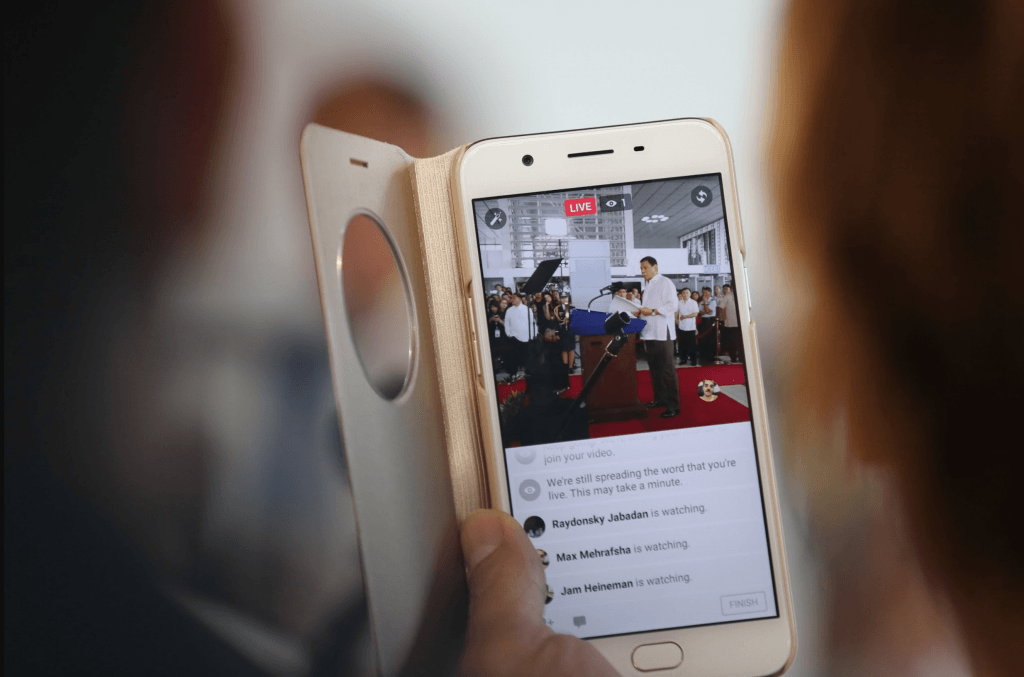Why 2020 disinformation campaigns may be outsourced to the Philippines
By Matt Field | August 23, 2019
 A person watching Philippines President Rodrigo Duterte on a phone. Credit: Wikimedia .
A person watching Philippines President Rodrigo Duterte on a phone. Credit: Wikimedia .
As reporters, propaganda experts, and government officials ponder where the next plot to manipulate an election using social media will emerge, one country on the map appears to be blinking red: the Philippines. If that comes as a surprise, consider that Filipinos spend on average 10 hours a day online, that almost everyone older than 13 uses social media, and that Facebook is accessible on smartphones without paying data charges. The Philippines is a place where troll armies duke it out across the country and where an increasingly sophisticated web of public relations firms and social media contractors is emerging.
The disinformation industry in the country got a jump start when President Rodrigo Duterte employed a so-called keyboard army of paid trolls and supportive volunteers to help pave his way to an election victory in 2016. Politicos took note, taking up elements of Duterte’s online playbook even if some decried his tactics. A new report by researchers in the United States and Australia on social media disinformation in the Philippines paints a picture of a political environment in which “YouTube hosts impostor news channels with click bait headlines and hyper-partisan content” and “micro-influencers on Instagram discreetly seed political propaganda in between ‘organic’ content.”
Katie Harbath, Facebook’s public policy director for global elections, called the Philippines “patient zero” in a talk about disinformation in politics last year. While much of the social media disinformation that reporters and academics have catalogued was created for domestic consumption, a recent article in The Washington Post suggested that could change. The network of troll farms offering the services of real humans to feed fake accounts is growing and seeking global clientele. Camille François, whose firm, Graphika, produced a report on Russia’s social media manipulation in the 2016 US election for the US Senate, told the newspaper that the “Philippines shows us trends that are headed this way.”
The newspaper interviewed half a dozen trolls in the Philippines who, for example, described an effort that employed hundreds of fake accounts to boost a local politician by puffing up the ranks of his online supporters, pushing positive messages about him, and debating his online critics. “These ambitious operators now want to turn their country into the go-to place to influence corporate and political campaigns worldwide—using the same young, educated, English-speaking workforce that made the Philippines a global call center and content moderation hub,” the Post reported.
Facebook regularly reports taking down networks of accounts made to mislead viewers about the people or groups behind them. Most recently the company took down 89 Facebook accounts with links to the Myanmar military. Twitter, meanwhile, suspended accounts linked to the Chinese government that had been trying to influence protests in Hong Kong. As social media platforms get better at identifying disinformation campaigns, malicious actors are employing a more bespoke form of propaganda. On some networks, they’re using fewer fully-automated bot accounts and more human input—exactly the type of services offered by the Filipino trolls and their firms. Harbath in her speech last year described the difficulty Facebook had in identifying fake accounts operated by rooms full of people who created profiles under pseudonyms to “try to push out content.”
University of Massachusetts Professor Jonathan Corpus Ong, Australian National University researcher Ross Tapsell, and University of Canberra Professor Nicole Curato published an in-depth report this month on disinformation in the Philippines, offering an account of how so-called black ops campaigners pushed disinformation to targeted groups through fake accounts. Operating under a hierarchical structure, teams would push content in local languages, taking orders from higher-ups in Manila. The social media operators wouldn’t work for candidates directly, maintaining a level of plausible deniability. As Yvonne Chua, a journalism professor at the University of the Philippines, told the Post, “It has come to a point where you can rely on the Philippines for all sorts of things: trolls, click farms, whatever you want.”
Publication Name: The Washington Post
To read what we're reading, click here
Together, we make the world safer.
The Bulletin elevates expert voices above the noise. But as an independent nonprofit organization, our operations depend on the support of readers like you. Help us continue to deliver quality journalism that holds leaders accountable. Your support of our work at any level is important. In return, we promise our coverage will be understandable, influential, vigilant, solution-oriented, and fair-minded. Together we can make a difference.
Keywords: Disinformation, Facebook, Philippines, Rodrigo Duterte
Topics: Disruptive Technologies, What We’re Reading














